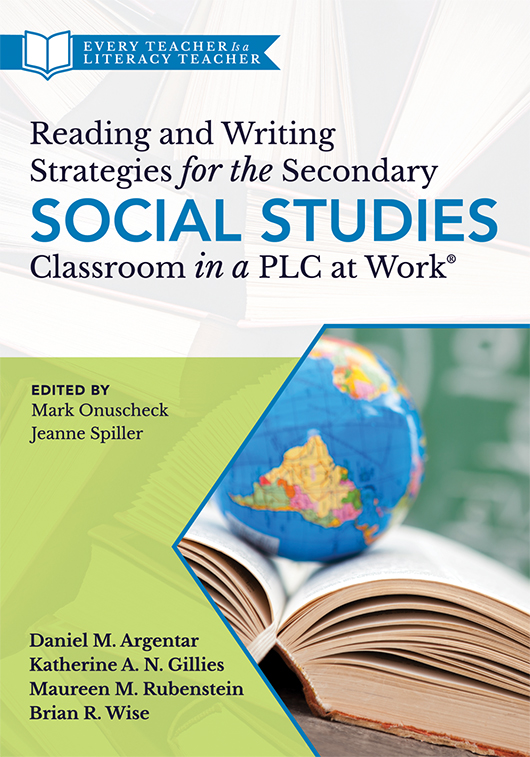Free Reproducibles
Reading and Writing Strategies for the Secondary Social Studies Classroom in a PLC at Work®
Prepare middle school and high school students to read, write, and think like social studies experts and historians. Part of the Every Teacher Is a Literacy Teacher series, this resource details how grades 6–12 teachers can work together to support literacy development and social studies learning. Explore how to develop collaborative teams, differentiate instruction, design meaningful common assessments, and more.
Benefits
- Recognize the need for and benefits of literacy development in social studies classrooms.
- Learn why collaboration among different content-area teams in a professional learning community (PLC) can enhance reading and writing instructional strategies.
- Foster student engagement by utilizing adaptable strategies for developing prereading, during-reading, and postreading skills in social studies.
- Apply strategies for writing development in social studies.
- Obtain tools and techniques for designing meaningful assessments that align with social studies standards and literacy goals of secondary education.
Table of Contents
Introduction: Every Teacher Is a Literacy Teacher
Chapter 1: Collaboration, Learning, and Results
Chapter 2: Foundational Literacy Triage
Chapter 3: Prereading Strategies
Chapter 4: During-Reading Strategies
Chapter 5: Postreading Strategies
Chapter 6: Writing Strategies
Chapter 7: Assessment
Epilogue
Appendix: Reproducibles
PRINTABLE REPRODUCIBLES
Chapter 1
- Figure 1.1: Content-Standard Analysis Tool
- Figure 1.2: Discern Whether Text Tasks Match Complex Disciplinary Demands
Chapter 3
Chapter 7
Appendix
- Reading Comprehension Process
- Content-Standard Analysis Tool
- Prereading Anticipation Guide
- Quick-Write Prompts
- Frayer Model Template
- Beliefs and Opinions Survey
- Find Evidence to Support Claims
- Text-Dependent Questioning Graphic Organizer
- Primary Source Graphic Organizer
- Five Words Recording Sheet
- Student-Generated Questioning Taxonomy
- 3–2–1 Activity
- Two-Quote Paragraph Template
- Evaluating Claim Statements and Supporting Them With Evidence
- Rubric to Evaluate a Writing Sample
- Historical Sentence Starters
SUGGESTED RESOURCES
BOOKS
- Bailey, K. & Jakicic, C. (2012). Common Formative Assessment: A Toolkit for Professional Learning Communities at Work. Bloomington, IN: Solution Tree Press.
- Buffum, A., Mattos, M., & Malone, J. (2018). Taking Action: A Handbook for RTI at Work. Bloomington, IN: Solution Tree Press.
- Conzemius, A. E., & O’Neill, J. (2014). The Handbook for SMART School Teams: Revitalizing Best Practices for Collaboration. Bloomington, IN: Solution Tree Press.
- DuFour, R., DuFour, R., Eaker, R., Many, T.W., & Mattos, M. (2016). Learning by Doing: A Handbook for Professional Learning Communities at Work (3rd ed.). Bloomington, IN: Solution Tree Press.
- Marzano, R. J. (2017). The New Art and Science of Teaching. Bloomington, IN: Solution Tree Press.
- Townsley, M. & Wear, N. L. (2020). Making Grades Matter: Standards-Based Grading in a Secondary PLC at Work. Bloomington, IN: Solution Tree Press.
- Watanabe-Crockett, L. (2019). Future-Focused Learning: 10 Essential Shifts of Everyday Practice. Bloomington, IN: Solution Tree Press.
WEBSITES
- Adlai E. Stevenson High School, “Great Depression: Images”
- AllThingsPLC
- CommonLit
- Good Free Photos, “World War II Photos”
- Google Classroom
- Kahoot!
- Lexile, “How to Get a Lexile Measure”
- Lexile & Quantile Tools, “Quick Search”
- Mastery Manager
- Minimum Wage
- Newsela
- NWEA
- ProLiteracy, “U.S. Adult Literacy Facts”
- Quizizz
- Renaissance Learning
- SourceWatch

